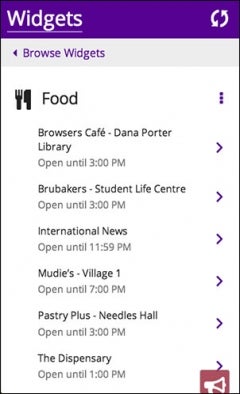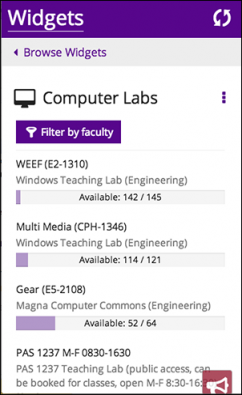
Open data at Waterloo fosters student innovation
University’s open data initiative is important resource for Waterloo Student Portal

University’s open data initiative is important resource for Waterloo Student Portal
By Christian Aagaard Marketing and Strategic CommunicationsKartik Talwar wanted something more out of the University of Waterloo when he arrived as a student in 2010: information, and lots of it.
It wasn’t that it didn’t exist; it was just in scattered digital nooks and crannies. Talwar, who graduates this year in math and physics, sought a single source from which to shape his student life, a giant repository of data about programs, courses, timetables and services.
So he built one, invited others to contribute and collaborate, and thus added his weight behind the University’s advance into the world of open data.
“If (data) is accessible to a lot of people, they can find creative ways to make sense of it, or use it in some way you would never have thought of,” Talwar says.
February 21 marks International Open Data Day. Open data is as much a movement as it is a thing.
As a thing, open data forms part of the digital trail organizations and individuals leave behind going about their daily activities.
As a movement, it is the push to get more of that raw information into the public realm, where it can be turned into useful tools for living. Advocates argue that the inventiveness and agility to put open data to good use lies with individual users, not large holders of information.
It takes some convincing. Protection of individual privacy remains a major concern among governments and institutions. Open data does not include personally identifiable information.
At Waterloo, open data drives a wide range of projects, from keeping track of the University’s Canada goose population to keeping an eye the on the world’s polar regions.
Talwar had gathered datasets under his own website by the summer of 2011. That fall, he moved the project to the University’s Open Data API initiative. API stands for application program interface — the means by which users engage with datasets to build their own programs.
Now loaded with more than 80 datasets, the Open Data API is an important resource for the Waterloo Student Portal and UWFlow, an independent course planner created by Waterloo students in 2012. Flow isn’t a static, read-only service. Among other things, it allows students to review and rate courses, and add custom features to their schedules.
Students could do some of this by creating their own “scrapers” — programs that shake out specified bits of information from websites.


Examples of widgets from the Student Portal that provide real-time information about which campus eateries are open or which computer labs have available space.
“Providing open data significantly decreases the duplication of work, and as a result of reducing the duplication of work, it tends to foster innovation,” says Jamie Wong, one of UWFlow’s co-founders.
Using datasets on the API site, students can build — and share —programs that alert them to such things as changes to exam schedules or the arrival of a favourite meal on the food-services menu.
“It’s a wide range we put out there,’’ says Nathan Vexler, who went from being a student advocate for open data to service lead for the API project. “We don’t know what students are going to make out of it.”
“We are able to put something out there, and developers create new value (out of things) that are important to their audience.”

Nathan Vexler, service lead for Waterloo's API project.

Read more
Transformative AI innovations, data and ethics are the focus across digital health academia, clinical practice and industry

Read more
Catherine Burns hosts panel of academic and industry experts across the health tech ecosystem at THE Digital Health 2024 at Stanford University

Read more
Summit will bring together prominent global experts in health and technology to accelerate innovation through academic-industry partnerships
The University of Waterloo acknowledges that much of our work takes place on the traditional territory of the Neutral, Anishinaabeg and Haudenosaunee peoples. Our main campus is situated on the Haldimand Tract, the land granted to the Six Nations that includes six miles on each side of the Grand River. Our active work toward reconciliation takes place across our campuses through research, learning, teaching, and community building, and is co-ordinated within the Office of Indigenous Relations.